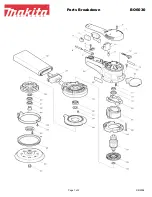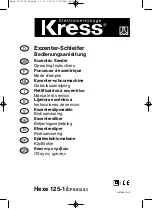
3. SPECIFICATION
DO NOT
use the polisher with abrasive cleaners or rubbing compounds as excessive paint removal may result.
DO NOT
get the polisher wet or use in damp or wet locations or areas where there is condensation.
DO NOT
allow untrained persons to operate the polisher.
DO NOT
operate the polisher when you are tired or under the influence of alcohol, drugs or intoxicating medication.
DO NOT
use the polisher where there are flammable liquids, solids or gases such as paint solvents, etc.
DO NOT
leave the polisher operating unattended.
DO NOT
carry the polisher with your finger on the power switch.
DO NOT
pull the cord from the power supply.
use a qualified person to maintain the polisher.
When not in use, unplug from the mains power supply and store in a safe, dry, childproof area.
2. INTRODUCTION
random orbital polisher with Ø230mm 5 ply foam pad and two polishing bonnets. smooth operation provides even buffing/polishing with no
hot spots. Impact resistant ABs housing with 360º grip. supplied with 4mtr cable and Bs approved plug. Gs/tuV and cE approved.
4. OPERATION
WARNING! Ensure that you read, understand and apply the safety instructions in Section 1.
WARNING! Excess pressure can cause damage to paintwork and will put the polisher motor under strain. Polishers returned
with burnt out motors will be rejected as a warranty claim. Normally the weight of the polisher is sufficient.
WARNING! Do not use the polisher with abrasive or rubbing compounds.
4.1.
Before each use, check that the bonnet is clean and free of abrasive particles and is undamaged and that the pad rotates freely.
4.2.
Apply a small amount of polish/wax evenly over the surface of the bonnet. Do not apply polish directly to the vehicle surface.
4.3.
Hold the polisher firmly by the handles and place the polishing face onto the panel to be polished.
4.4.
start the polisher by pressing the red on/off switch, ensuring that the pad is still in contact with the vehicle panel.
4.5
Move the polisher with broad sweeping strokes over the surface in a criss cross pattern. Do not apply pressure to the polisher when in
use. Work in logical areas and re-apply the polish/wax at intervals during the polish application process. Do not allow the foam pad to
become saturated with polish/wax as this will make polishing more difficult and will reduce pad life.
4.6.
Polish/wax should be applied to difficult-to-reach areas by hand.
4.7.
switch off the polisher before lifting it from the panel when polish application is completed.
4.8.
remove the application bonnet and replace it with the wool bonnet.
4.9.
Buff the polish/wax in the same order it was applied. Do not put pressure on the polisher but allow its weight and action to do the job.
4.10 Badly oxidised paint may require several applications. Do not use abrasive compounds.
4.11
If the polish/wax is difficult to buff too much has been applied. this may also cause the bonnet to come off the pad.
WARNING! Do not immerse the polisher in water.
Model no: . . . . . . . . . . . . . . . . . . . . . . . . . . . . . Er230P
Input: . . . . . . . . . . . . . . . . . . . . . . . . . . . . . . 230V - 0.4A
Power: . . . . . . . . . . . . . . . . . . . . . . . . . . . . . . . . . . . 90W
speed: . . . . . . . . . . . . . . . . . . . . . . . . . . . . . . . .3500rpm
Vibration . . . . . . . . . . . . . . . . . . . . . . . . . . . . . .16.3m/s²
Pad size: . . . . . . . . . . . . . . . . . . . . . . . . . . . . . . .230mm
cable Length: . . . . . . . . . . . . . . . . . . . . . . . . . . . . . 4mtr
replacement Backing Pad: . . . . . . . . . . . . . Er230P.BP
replacement Bonnet terry cloth: . . . . . . . . Er230P.tB
replacement Bonnet synthetic Wool: . . . . . Er230P.WB
noise Power . . . . . . . . . . . . . . . . . . . . . . . . . . 59.5dB.A
noise Pressure . . . . . . . . . . . . . . . . . . . . . . . . 70.5dB.A
5. MAINTENANCE
5.1
Always store the polisher on its side so that the foam pad does not become compressed and/or distorted.
5.2
remove the bonnet when not in use to allow the foam pad to dry out.
5.3 clean the bonnet regularly by hand washing with soap and water. Do not immerse the foam pad in water. Washing the bonnet is sufficient.
5.4
to remove the foam pad, proceed as follows.
1. remove the bonnet.
2. Insert a rod (cross head screwdriver or similar) into one of the two holes holes in the pad.
3. rotate the pad until the rod contacts the counter weight.
4. undo the centre bolt using a 14mm socket. the socket has a reverse thread, turn it clockwise to undo it and anticlockwise to tighten it.
Environmental Protection.
recycle unwanted materials instead of disposing of
them as waste. All tools, accessories and packaging
should be sorted, taken to a recycle centre and
disposed of in a manner which is compatible with
the environment.
When the product is no longer required, it must be
disposed of in an environmentally protective way.
rechargeable battery contains nickel cadmium
(nicad). It is recyclable. take to your local recycling
centre to be disposed of properly. Do not incinerate
nicad battery as it may explode when exposed to
fire. Do not attempt to open battery pack.
NOTE:
It is our policy to continually improve products and as such we reserve the right to alter data, specifications and component parts without prior notice.
IMPORTANT:
no liability is accepted for incorrect use of this product.
WARRANTY:
Guarantee is 12 months from purchase date, proof of which will be required for any claim.
INFORMATION:
for a copy of our latest catalogue and promotions call us on 01284 757525 and leave your full name and address, including postcode.
01284 757500
01284 703534
Sole UK Distributor, Sealey Group,
Kempson Way, suffolk Business Park
,
Bury st. Edmunds, suffolk,
IP32 7Ar
www.sealey.co.uk
Web
Original Language Version
Er230P Issue no.2 02/11/10
Risk of Hand Arm Vibration Injury
Car Polisher 230mm
Model no. Er230P when operated in accordance with these instructions and tested in accordance with
Bs En 28662-1:1993, Iso 8662-1:1988 and Bs En Iso 8662-8:1997 results in the following vibration emission declared in accordance with
Bs En 12096:1996.
Measured vibration emission value:
16.3m/s²
Uncertainty:
6.51m/s²
these values are suitable for comparison with emission levels of other tools that have been subject to the same test.
This tool may cause hand-arm vibration syndrome if its use is inadequately managed.
Recommended Measures to reduce risk of hand-arm vibration syndrome:
this tool should not be used by an individual regularly for more than 23 minutes in any 8 hour period.
this duration of use should be reduced if the individual is exposed to hand-arm vibration from other sources.




















